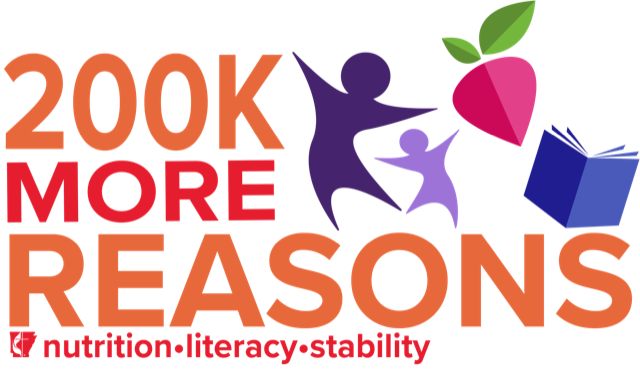Home » Our Ministries » 200,000 More Reasons » Stability
Stability
Goal: 35% of churches will offer ministries that promote a healthy and stable family life for food-insecure children through such ministries as nutrition education, mental health support, including resourcing access to substance abuse assistance and support groups for families in need.
Why: Food insecurity and other at-risk factors can have traumatic effects on children. Adults and future adults need support to alleviate impoverished conditions. Some families in poverty don’t have the resources to address other destabilizing forces such as substance abuse, depression, disease, and being overwhelmed by caring for their family members. 200,000 More Reasons is our way to help the children who suffer by offering support to the adults in their lives.
- Substance abuse is a major destabilizer for many families. There were approximately 750 opioid-related deaths in Arkansas in 2017.3 Drug abuse and overdose affects all races, classes, ages, and gender. It does not discriminate.
- MissionInsite Reports can be used to find out what is important in your community. One report in the Delta near Marianna showed that families expressed concern about personal health and life, such as
- struggling with weight,
- health problems,
- depression,
- caring for aging parents,
- violence in their neighborhood,
- day-to-day financial matters, and
- making right choices or finding direction.
By offering creative ministries open to low-income, at-risk families in your mission field, there is hope that families can learn healthier ways of coping with circumstances to create more stability at home. With more stability, the chances of alleviating poverty and ending food insecurity for these families become greater.
Turning Tragedy Into Ministry – Mary K. Meacham of Brinkley is the perfect example of how working through grief can bring benefits to thousands.
Ministry Examples and Ideas
- Grandparent Support Groups
- Nutrition Education Programs, including Cooking Matters
- Group gathering or studies for health education (weight, diabetes, exercise, etc.)
- Peer Recovery Group, AA & Resources for Substance Abuse Crisis
- Dose of Reality Video for Youth Pastors, Parents, and Youth Groups
Additional Resources
- Stay Positive Arkansas utilizes regional partnerships with certified behavioral health agencies to ensure that Arkansas residents impacted by COVID-19 are provided rapid access to help.
- The Arkansas Department of Health’s Family Health Program will provide free training around many important topics.
- COVID-19 and Mental Health
- Arkansas Chapter, American Foundation for Suicide Prevention
- Redefine Grace Workbook (from Grace Alliance)
- Tiny Guides (from Cultures of Dignity)
- Promoting Healthy, Stable Families: Ways United Methodist Churches Can Meet The Challenge
- Ranking the States on Mental Health
- Addressing ACEs In Arkansas: A Legislative and Stakeholder Analysis of ACEs in Arkansas
- America’s Health Rankings — Focus on Arkansas
The University of Arkansas Cooperative Extension Office offers free (or low-cost) curriculum and support, including leaders in some situations. Find your local office at uaex.uada.edu/counties or email Brittany Schrick for assistance.
Curricula include:
- Adventures in Grandparenting
- Faith & Nutrition
- Living Well with Diabetes
- Walk Across Arkansas (walking groups)
- Parenting with a Good Heart
- Co-parenting in Divorce
- Marriage Garden
- Stress Management
- Gardening
Additional Cooperative Extension Office resources also include resources on Life Skills and Wellness as well as Yards and Gardens.
To start or expand a ministry around food, literacy, or promoting healthy, stable families, contact Mary Lewis Dassinger at mdassinger@arumc.org or 501-425-9049 for assistance.
200,000 More Reasons Mental Health Task Force
| Name | District | Organization | Connection to Mental Health | |
|---|---|---|---|---|
| Rev. Garry Teeter | Central | garry.teeter@arumc.org | Bread of Life | Counseling |
| Amy Shores | Central | ashores@methodistfamily.org | Wesley Foundation @ UCA | Mental Health First Aid Training |
| Rev. Dawn Spragg | Northwest | dawn.spragg@arumc.org | Central UMC Rogers | Youth Mental Health/Family Counseling |
| Rev. Candace Barron | Northeast | candace.barron@arumc.org | Beebe FUMC | Veterans Affairs Perspective |
| Mary Meacham | Southeast | mary.afsp.ar@gmail.com | AR Chapter of American Foundation for Suicide Prevention | Suicide Prevention Training |
| Rev. Tom Mullins | Southeast | rollie.mullins@arumc.org | McGehee UMC | Parish Perspective |
| Rev. Jay Stephen Simpson | Southwest | jaystephen.simpson@arumc.org | Christ UMC Texarkana | Parish Perspective |


